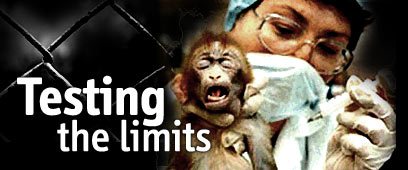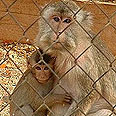

Future animal testing victims
Photo: Israeli Society for Abolition of Vivisection
TEL AVIV
- Thousands of animals may be dying and suffering needlessly every year in the country because regulation of scientific and commercial animal testing is in disarray.A recent State Comptroller's report criticized the National Council on Animal Experimentation, saying the council gave free rein to organizations and private companies that conduct animal testing by allowing them to supervise their own animal testing procedures.
The council, which operates under the Health Ministry, was established in 1995 to grant permits for animal experiments and oversee their execution, in accordance with the Animal Protection Law of 1994.
The law permits experiments on animals, but places restrictions on them to minimize the animals' suffering.
Organizations and companies were permitted to set up in-house committees to supervise animal testing. However, the comptroller’s report said the organizations in practice authorize experiments with disregard for the council even though they must officially report to it.
"The council authorized internal committees for almost every organization, without setting any sort of criteria," the report said. "In addition, the council did not establish a mechanism that would enable it to ensure the internal committees are functioning properly."
'The NCAE is a rubber stamp'
The report also said in-house committee members are those who conduct the experiments in many organizations. So, in effect, they authorize their own requests to conduct animal testing.
Sagy Agmon, legal counselor to animal rights groups Let the Animals Live and The Society for Ethical Science, said the council is doing everything possible to allocate authority to the organizations that carry out the experiments.
"The NCAE is a rubber stamp," he said. "To my knowledge, no request for animal experimentation has ever been denied."
Council Chairman Prof. Ehud Ziv said he is new to the position and deferred comments to the Health Ministry. The ministry rejected some of the anti-vivisectionists’ specific complaints, such as that the council operates in secrecy and is ridden with conflicts of interest, but said it has set up an internal panel to review the comptroller’s criticisms.
The Animal Protection Law says requests for authorization of animal experiments are to be denied if the researchers can achieve the same results while using reasonable alternative methods of experimentation.
In 1999, the council published its own regulations for the use of these alternative methods, demanding organizations and companies use alternative methods as frequently as possible, and reduce to a minimum the number of animals used in the experimentation process and minimize their pain and suffering.
Israel lags behind in animal-testing alternatives
However, the State Comptroller found the council is not abiding by its own regulations.
"The NCAE only demands that the researchers state 'there is no alternative to the requested experiment,' and does not ask them to elaborate on the actions they took in searching for alternatives," the report said.
In 2003, Let the Animals Live, in cooperation with the Society for Ethical Science, filed a plea with the Tel Aviv District Court to publicly expose the council’s protocols on alternative methods of experimentation. The filing was one of a series of complaints animal rights activists have made against the council.
"How is it possible that 10 years after its inception, the NCAE did not authorize even one alternative, when so many of them are being used around the world?" Agmon said.
The court ordered the council to hand over minutes of its meetings regarding the possible alternatives to animal testing. The protocols revealed the council discussed various alternatives for animal testing since 1997, but always came up with some odd reason for why the alternatives could not be authorized for use, Agmon said.
"One alternative method of experimentation was dropped because the council claimed companies that will be forced to use the alternative will not be able to export their goods to China," he said.
Animal rights supporter and former council member Danny Sherman said he left the council after his attempts to advance the alternatives issue, among others, were thwarted by the majority members.
"I gave up," he said. "I wanted to work where I can actually have an influence, so I allocated my efforts toward fighting the artificial goose-fattening industry."
The problem with implementing alternatives is that it is simpler to continue using the standard methods of experimentation that have been used for years, said veterinarian Andre Menache, a council member until late 2003 and currently a scientific consultant for Animal Aid in England.
"In Tel Aviv's Tel Hashomer Hospital, they are used to using monkey kidney cells to diagnose children's' viruses," he said. "These cells have to be fresh, so they constantly kill monkeys."
Anat Refuah of the Israeli Society for Abolition of Vivisection, said organizations do not want to switch to alternative methods of experimentation because it would force them to alter their working habits, restructure existing labs, and even make personnel changes.
"No one wants to fire someone who has worked in the lab for 30 years," she said.
Animals feeling the pain
Ayelet Salee-Raiz of the Society for Ethical Science, said the council allows experiments to be carried out with complete disregard for the animals' well being, although the Animal Protection Law says it must work to "minimize the suffering" of animals used in experiments.
"Procedures which are extremely painful to the animals are being approved," she said. "They allow experiments to be conducted without the use of anesthesia or pain killers."
Sherman said to "minimize the suffering" would also include using anesthesia and granting animals reasonable living conditions, but the lack of supervision allows researchers to do whatever they please.
"A monkey in a cage needs some enrichment tools, such as games or dolls, to dull his feeling of loneliness," he said. "But this won't improve the experiment's results, and the research budget is limited. The conditions are horrendous."
A committee shrouded in secrecy
The council consists of 23 members, but only three represent Noach, the umbrella organization of animal rights groups in Israel. The majority represents private industry and academia, with a handful coming from the government.
Council member Ehud Peleg, who is also a legal advisor to Noach and whose petition to the High Court in 1990 helped pave the way for the enactment of the Animal Protection Law, said one of the problems the law produced is the council's unbalanced structure.
"The law created a few loopholes that we are suffering from today," he said. "The council's lineup makes its deliberations a farce."
Ziv headed a committee appointed by the Council of University Directors to coordinate the public relations efforts regarding vivisection.
"No one is more biased when it comes to supporting animal testing than Ziv," Agmon said.
Council member and Noach representative Dr. Elad Feigin of Shaarey Zedek Hospital in Jerusalem said the council wants to maintain the status quo regarding animal experimentation.
"It's like letting cats guard the cream," he said. "I don't believe the council is capable of doing anything in its current lineup."
According to Feigin, the council operates under a blanket of secrecy, and the anti-vivisection representatives are shunned from all aspects of the council's activities and decisions.
"I don't get invited to the meetings, because the other members do not want any opposition,” Feigin said.















